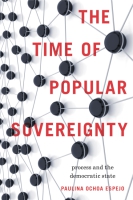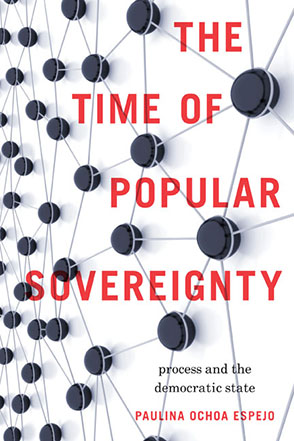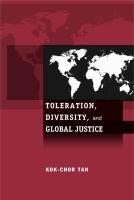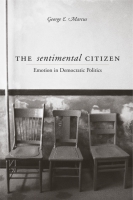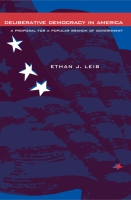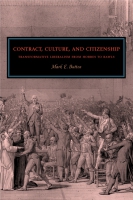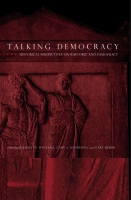The Time of Popular Sovereignty
Process and the Democratic State
Paulina Ochoa Espejo
“‘The people’ is both a perennial feature and an enduring problem in our understanding of democracy. In The Time of Popular Sovereignty, Paulina Ochoa Espejo clears away centuries of conceptual clutter, showing a keen awareness of the paradoxes that plague this project. Her solution is refreshing: stop thinking of a democratic people as a goal to be achieved, and start thinking of it as an ongoing process. Her dynamic view of democracy charts exciting terrain in democratic theory and moves our thinking in provocative new directions.”
- Media
- Description
- Reviews
- Bio
- Table of Contents
- Sample Chapters
- Subjects
The MacMillan Report featured Professor Paulina Ochoa Espejo in its February 1, 2012 episode.
“‘The people’ is both a perennial feature and an enduring problem in our understanding of democracy. In The Time of Popular Sovereignty, Paulina Ochoa Espejo clears away centuries of conceptual clutter, showing a keen awareness of the paradoxes that plague this project. Her solution is refreshing: stop thinking of a democratic people as a goal to be achieved, and start thinking of it as an ongoing process. Her dynamic view of democracy charts exciting terrain in democratic theory and moves our thinking in provocative new directions.”
“If the paradox of political founding is an enduring one, we would do well to look for alternative formulations that do not pretend to resolve it but that show us what politics can be in the light of its ineliminability. Paulina Ochoa Espejo does precisely this by conceiving the democratic people as a process rather than an association, its members as relational events rather than discrete individuals, interacting and changing creatively through time. Mainstream democratic theorists will be compelled to engage with this work, which shows effectively how their pretensions to legitimate democratic practices continue to rely on fictions they claim to have moved beyond.”
“In this unusual and original work, Paulina Ochoa Espejo analyzes a foundational concept of all modern political thought: the people. She brings aesthetic as well as metaphysical theories of process to bear on this concept, resulting in some astonishing observations about temporality and ‘the people.'”
“How can ‘the people’ govern when they are always changing and most of them never meet? By depicting ‘the people’ as ever in process, Paulina Ochoa Espejo provides fresh answers to some of the most perplexing problems of modern democratic theory. An important and stimulating contribution.”
Paulina Ochoa Espejo is Assistant Professor of Political Science at Yale University.
Contents
Acknowledgments
Introduction: The Time of the People
1. The Mob and the People in Mexico: A Historical Example of the Indeterminacy of Popular Unification
2. A Problem in Liberal Democratic Theory: The Indeterminacy of Popular Unification
3. Mechanical and Teleological Conceptions of the People
4. Dynamic Constitutionalism and Historical Time
5. The People Between Change and Stability
6. Creative Freedom and the People as Process
7. A Democratic People as Process
Conclusion: Radical Realism
Bibliography
Index
Introduction
The Time of the People
Imagine a black-and-white photograph. Its coarse grain tells you that it is an enlargement of another picture. The photo depicts a man wearing a broad-brim hat. He gazes beyond the frame, raises his clenched fist, and opens his mouth: he may be shouting or singing. Now imagine a second photograph. This one zooms out from the first. The man remains the focus, but the image now reveals a larger area around him, with a crowd thronging the picture’s frame. You can see men and women carrying banners; many of the people raise clenched fists and seem to chant. Zoom out again. A third photograph depicts buildings framing the open space where thousands gather. The assembly fills a big city square, and you lose sight of the man in the hat. He blends with all others in support of their common cause.
This series of photographs illustrates a widely held conception of the people. It depicts the people as an aggregate: individuals compose a people, and individual political wills compose a people in the political sense. This conception underlies many arguments for democratic legitimacy. In these arguments, all individual wills in the community become a popular will when they agree, and only the resulting unified will is said to legitimize rule democratically.
Democrats everywhere cherish this traditional conception of the people. But it is as problematic as it is attractive. If you return to the photograph of the city square, you will see that the people, thus conceived, is not there. Look again at the third photograph. The aggregate it captures excludes many individuals. For instance, children, the mentally ill, and foreigners cannot contribute their political will. The photograph also shows many individuals who chose not to join the rally: some stand aside, and others peek at the crowd from the balconies surrounding the square. With more pixels, you would see that many do not chant or raise their fists. But not even the highest resolution could show you those who did not go to the rally or those who changed their minds and no longer believe in the cause.
The traditional conception of the people is problematic because it holds that only a unified popular will legitimizes the foundation of a state. Hence it has to show that a given people is or was unified in order to prove that a state is legitimate. Yet the conception cannot point to any instance of this unification because the populace changes constantly. Every time you try to frame an actual populace according to the traditional conception of a unified people, the populace has already changed. How can you legitimize a democratic foundation if you cannot show that the people are or have ever been unified?
Observe the people in the square again. Return to the photograph of the man in the hat. Now imagine you could add the dimension of time by pressing a Play button. Almost immediately after you press it, the man exits the frame, but as he leaves, other men and women enter the picture. Some chant, some keep silent, others push their peers, while the crowd as a whole pulls others along. Occasionally you can distinguish their faces, but they quickly leave your field of view, and often you can only get a quick glimpse of their shirts, their backpacks, or their hair. You struggle to focus your attention because the image changes rapidly. Nevertheless, if you zoom out until you can see the whole square at once, something will catch your eye. Suddenly you discern patterns of sound, of movement, and of stillness: patterns like the ululation of the chants, or the tendency of groups to form in some parts of the open square and not in others. Over time the constant alteration acquires a peculiar character. Some events occur regularly, and the movement in the city square may become something recognizable over a longer period. This “something recognizable” is not the unified people that the traditional conception seeks to capture. In fact, it is not even a unified thing, just as hurricanes, heat waves, and football matches are not unified things. Yet this something is just as real as a hurricane. When you consider time and change, you realize that a people does not originate when individuals merge into a bigger thing. Instead, a people arises when many actions and movements combine into novel patterns of change. For a people is always in the making or unmaking.
This book is about the people changing in time. I will argue that we should conceive of the people as a process rather than as an aggregation of individuals. Doing so, I argue, dissolves the problem of legitimizing rule democratically as the composition of the people changes. The people conceived as a process can be a source of democratic legitimacy that moors state institutions but is compatible with surprise and innovation. But before I discuss the people as process, let us step back and review the source of the problem I address: the thesis of popular sovereignty.
Popular Sovereignty
Popular sovereignty is the contention that the unified will of the people is the supreme authority in a state. Many political thinkers dislike this contention, and it is not difficult to see why. The idea that all individuals in a whole state could unify their wills is odd at best and dangerous at worst. Many a tyrant has abused this idea and committed atrocities in the name of the people. So it is not surprising that many political thinkers reject the thesis on the grounds that supreme authority is a dangerous idea, or that the unification of popular will is improbable, and maybe even impossible. Yet this odd and dangerous thesis prevails in the history of political thought. In fact, politicians and political thinkers have used it incessantly for at least two hundred years. So why has this implausible and risky idea survived in politics and political thinking for such a long time?
You could argue that the thesis of popular sovereignty stays in circulation because of its rhetorical force. By evoking images of a unified people, the idea often persuades individuals to support a particular cause, leader, or government. Detractors of the thesis commonly argue that the will of the people cannot be unified, and that no honest politician could use the concept with a straight face. In this view, crafty leaders manipulate naïve publics to believe that the leader’s aim is the general will. But even if this were true, neither the innocence nor the ignorance of the public can explain why the idea of popular sovereignty recurs in politics and, a fortiori, why it recurs in political philosophy. Invoking the people’s will may bring cheers at a rally, but this alone cannot sustain the idea of a unified will in philosophical arguments. Rhetorical power does not explain why the thesis appeals to philosophers and the public alike. Why, then, is the thesis so prevalent? Why does it have such influence?
The answer lies in a promise implicit in the thesis’s traditional formulations: that of a good and just state. Those who employ popular sovereignty tacitly argue as follows: A state is good and just only when it guarantees individual freedom and equality, as well as social coordination. And this guarantee can be made good only when all individuals govern together or unanimously consent to rule—that is, when they all agree. They all agree when they recognize a true principle, obvious to reason, the recognition of which harmonizes all individual wills. The thesis of popular sovereignty presupposes this harmony and thus implicitly asserts that there exists a principle that harmonizes all wills through reason. It then promises that, provided we find this principle, we can have a state that is good and just. I believe this promise explains the resilience of the concept and the force of the image of “the people.”
The promise also explains why popular sovereignty is so problematic. For centuries politicians and writers have waved the flag of a unified and reasonable popular will in the rhetorical battle of liberty against tyranny. William Hazlitt’s prose is a model of this spirit and discourse:
[Common interest and abstract reason] taken together, as the test of the practical measures or general principles of Government, must be right, cannot be wrong. It is an absurdity to suppose that there can be any better criterion of national grievances, or the proper remedies for them, than the aggregate amount of the actual, dear-bought experience, the honest feelings, and heart-felt wishes of a whole people, informed and directed by the greatest power of understanding in the community, unbiased by any sinister motive. Any standard of public good or ill must, in proportion as it deviates from this, be vitiated in principle, and fatal in its effects.
In Hazlitt’s text, the aggregated experiences, feelings, and wishes of the people directed by the “greatest power of understanding in the community” are what I call the “coincidence of popular will and reason”: the harmonization of all individual wills through a principle of reason. This harmonization unifies a people, and it may legitimize the state. This notion is powerful because it can legitimize rule, as well as political change in the guise of popular revolutionary movements.
In sum, this traditional conception views the people as the supreme authority in the community when popular will coincides with reason. But if you hold that only an actual coincidence of popular will and reason can legitimize rule, popular sovereignty remains an odd idea. Consensus rarely obtains among small groups, and it is unfeasible among large populations. As Locke wrote, unanimous mutual “consent is next impossible ever to be had.” If we ask ourselves where does popular sovereignty get its strength, we find that the answer is not from actual unification, but rather from the promise of it. That is, popular sovereignty depends on the hypothetical coincidence of popular will and reason. Even Hazlitt, who seems to hold that the actual people can have a unified will, says that the people is unquestionably right only if the will of the people is led by “the greatest power of understanding in the community.” This condition implies that the people may not actually be unified, but if popular will coincided with reason it could unify.
This hypothetical view of popular sovereignty explains why the thesis prevails. Even when rulers commit abuses in the name of the people, a supporter of popular sovereignty could always argue that the abuse was not due to the idea but rather to its application. The people “cannot be wrong,” the supporter could argue: what passed as popular will was simply an abuse or a failed attempt at achieving an ideal of unification. The real people could still legitimize the state some other time.
A hypothetical unification of the people can legitimize rule because democratic rule does not require actual consensus: it is enough that state decisions are those that the people would make if they were unified. But how can we know what the unified people would decide? According to the thesis of collective autonomy and hypothetical unification, you can know what the unified people would decide if you can discover a principle that every free and rational individual would agree with, under the appropriate conditions. All the people would necessarily agree to this principle because it guarantees both autonomy and social coordination. Since it would be universally agreed to, it is a principle for the hypothetical unification of the people.
Such a principle can ground the legitimacy of a democratic state without an actual consensus. Even without unanimity, some members of the community could deduce, from the principles of freedom and autonomy, norms and procedures for constituting a democracy. So hypothetical unification can ground the constitution of a legitimate representative democracy. If you argue for a hypothetical version of popular sovereignty, you assume there is actual disagreement because the appropriate conditions do not obtain. Such conditions might be access to education and other requisites for moral development, or the provision of complete information and time to deliberate. You also assume that there is no good reason to disagree with the principle if the appropriate conditions did obtain. The possibility of agreement is good enough to legitimize a constitutional democratic order. Of course, at this point the whole argument turns on how to determine the principle that grounds a constitutional democracy. This may explain why theories of democracy that emphasize principles, like John Rawls’s contractualist theory of justice, are not concerned with the unification of the people. Instead, they concentrate on determining whether the principle that grants the possibility of agreement is morally adequate.
But determining the basic principle that justifies democracy cannot itself legitimize a democratic state. Knowing that the people ought to agree does not establish that individuals would will to do so, and if they do not actively will their government’s existence, their state cannot be legitimate. Even hypothetical versions of popular sovereignty implicitly go beyond the basic principle and guarantee the actual coincidence of will and reason at some point in the past or future. They may, on the one hand, displace the promise of unification to the past, as a reference to the original agreement that founded a democratic state. Constitutionalists, for instance, often use images of the past to legitimize the state. On the other hand, hypothetical theories displace the promise to the future as an ideal to be realized. An example comes from those theories that hold that a reasoned discussion, or deliberation, could produce agreement on principles of political morality. In short, theories of popular sovereignty sometimes posit popular unity in the future, and sometimes in the past, but they never demonstrate unification in the present, though they insist it must be there.
But how can you legitimize the state if the people is not unified at any given time? The question of unification and its displacement in time uncovers a grave problem with profound consequences for the theory of democracy and political theory in general. I will call this problem the “indeterminacy of popular unification.”
The Indeterminacy of Popular Unification
The problem is this: how do you legitimize rule democratically as the people’s composition changes? The problem arises from a condition for democratic legitimacy implicit in the thesis of popular sovereignty. This condition says that a state is legitimate only if those who are ruled consider that rule appropriate. But given that in a democratic state those who are ruled think rule is appropriate only when the body of the people accepts rule, the legitimacy of a democratic state depends on the people’s agreement on the reasons that justify rule. That is, in order to prove that a democratic state is legitimate, you must show that the people are or were unified in their agreement. Yet it is impossible to show this. Individuals never come together at one moment; the people changes continuously. While a hypothetical version of popular sovereignty presupposes that the people could unify in the future, the problem of popular indeterminacy shows that the people will never unify. Indeterminacy, therefore, challenges the legitimacy of the democratic state and poses a difficult problem for democratic theory.
Popular indeterminacy has been an important concern in political theory in recent years. But new research into the edges of the political community, the composition of the demos, and the popular legitimization of the state treats the problem only tangentially, since it often takes the unified people as a given. Thus it tends to ignore the question underlying the problem: What is a people? What is its nature? For example, much of the recent research dealing with the people in political philosophy and constitutional theory assumes that there already exists a people, and then turns to examining what this people can do. These scholars ask: Can the people make collective decisions and rule itself? Can the people agree on a justification for its government? Can the people bind itself? Can there be democracy beyond a given people? But they usually do not ask whether their implicit assumptions about the nature of the people are correct or coherent.
The indeterminacy of popular unification also poses a problem for political theory dealing with the boundaries of the people. Unless we have unification, we cannot tell whether there is a people, and thus we cannot determine who ought to be included in the demos. Yet most contemporary theorists who examine the political problems produced by massive immigration, extension of civil rights, and changes in national borders concentrate on the franchise. They have ignored the problem of who or what is the people underlying the electorate. These scholars also assume that there is a democratic people already, and then ask what are the appropriate rules for extending the franchise or constituting an electorate, or when secession or partition is justified.
The problem of popular unification is also relevant for constitutional scholars, but they see it from a different perspective. These scholars care about popular indeterminacy insofar as it produces a tension between constitutionalism and democracy. That is, they interpret the lack of popular unification as a rift between the liberal principles embedded in constitutions and the democratic practices that channel the concerns of actual mobilized populations. The indeterminacy of popular unification thus poses a problem for constitutional theory because unless we establish that a people has unified at a given time, we cannot understand how is it possible that free and equal individuals under democratic rule could be obligated to obey laws they did not create or approve. Unsurprisingly, however, constitutional scholars discuss this tension from within the democratic constitution; they do not focus on the people, without which the constitution would not even be possible.
The problem of indeterminacy is also important, though tangential, for recent scholarship dealing with popular legitimization or populism. This body of work asks how political regimes use the concept of the people to legitimize existing institutions, or how revolutionary groups rely on the concept of the people to justify radical change. This work has a similar approach to studies of the people from a historical perspective. Generally, both approaches assume that popular indeterminacy is unavoidable. Hence they study how the concept of the people in nationalist narratives and political philosophy helps hegemonic groups legitimize rule throughout history, even though unification (and thus democratic legitimacy) is always an elusive target. For this reason, they study how the people functions as an ideological stopgap. They do not try to understand the nature of the people, or whether the problem of indeterminacy can be overcome. In short, they are concerned with the sociological aspects of the problem of popular indeterminacy, not its normative aspects.
Finally, those scholars who deal critically with the theory of popular sovereignty also care about popular indeterminacy. They acknowledge that unless you show that the people unify at some point in time, it is hard to explain how the people could be sovereign. Like the scholars in the previous group, these critics of sovereignty often stress that the populace does not correspond to an ideal unified people. They frequently assume that the people is necessarily indeterminate, and on this basis they describe the inconsistencies, paradoxes, and perplexities that underpin the theory of popular sovereignty. So even though these scholars deal with the nature of the people in reference to the problem of indeterminacy, they are not directly concerned with overcoming the problems that indeterminacy poses to democratic theory. Instead, they offer a critique of the justification of democracy that relies on popular sovereignty.
In sum, all these discussions circle the concept of the people and the logical difficulties with the thesis of popular sovereignty. But none of them deals directly with the problem of indeterminacy of popular unification, or the underlying question of what is the people’s nature. Yet if you are interested in the normative aspects of the thesis of popular sovereignty, you cannot afford to ignore the problem. Unless you tackle it head-on, democratic theory is left exposed to charges of self-contradiction, and democratic politics in danger of losing any normative foothold.
A Dilemma in Democratic Theory
The indeterminacy of popular unification undermines the foundations of democratic theory. As I will argue in chapter 3, popular indeterminacy makes the traditional concept of the people collapse under the weight of logical problems, and with it, the legitimacy of democracy collapses as well. Moreover, without the concept of the people, even the principles of freedom and equality lose their traction within those arguments that seek to justify democratic rule. Further, these difficulties are not just abstract conceptual problems. Chapter 2 shows with historical examples that these theoretical difficulties can make it impossible for actual states to achieve political stability.
Many of the theorists mentioned above acknowledge the indeterminacy of popular unification. The two major strategies they have chosen for dealing with it, however, seem equally unsavory. In fact, these options lead to a dilemma: either you sustain democratic legitimacy while embracing the paradoxes of democratic theory, or you reject these paradoxes and give up on finding a democratic foundation for the political order.
The first horn of the dilemma—sustaining democratic legitimacy while tolerating paradox—may seem a sensible approach, for it presents a compromise that may be the best available policy. Such an approach appears both sensitive to the complexity of political life and flexible in the face of the irrationalities of practical politics. And it may also divert violence and avoid pain, as Paul Ricoeur has argued. But the position is ultimately unsatisfying because sustaining a paradox is a form of intellectual capitulation. It is also politically fragile because by acknowledging that democracy cannot achieve its aim, the position leaves democracy exposed to attacks. It is easy to argue, against this position, that any government that claims to be democratic is in fact using the name of the people to establish the hegemony of a group. If an open people produces a hegemony like any other group, the critics would argue, there is no good reason for preferring an indeterminate people to other versions of the people (such as an ethnic nation or a chosen people), since these appear to provide a more stable ground on which to build a state.
The second horn of the dilemma accepts the existence of the paradox, rejects logical inconsistency, and thus gives up on the people as a ground of legitimacy. Many radical critics on the Right and on the Left believe that the people is a chimera, and they deal with it as one would an imaginary animal. Some, including philosophical anarchists and critics of liberal democratic politics, dismiss the people as a dangerous fabrication that masks the realities of power. They urge us to do away with it, but they do not offer much in its stead. Others see the people as a form of idolatry. According to this traditional conservative view, the unachievable people usurps the state’s legitimate religious foundation.
In conclusion, the condition of indeterminacy in popular unification is costly because it produces two unpalatable reactions. The first rejects democratic legitimacy. The second tries to close the gap between the scattered individuals and the ideal people through such nondemocratic procedures as religious authority, nationalism, or political enmity. But there is an additional cost for political theorists. The indeterminacy of popular unification leads to stalemate in discussions about the legitimacy of the democratic state. Hence this indeterminacy challenges not only the legitimacy of the state, but also the imagination of political theorists. In sum, tackling indeterminacy is important, for at stake are the legitimacy of the liberal democratic state and our capacity to think creatively about the kind of political order we should strive for.
The People as Process
Dilemmas can be misleading, as there are often more than two possible solutions. As Julio Cortázar wrote, there is an infinite wind rose between yes and no. The problem of how to legitimize the state democratically despite popular indeterminacy can be solved, provided one looks beyond the dilemma’s two horns. But to find a genuine solution we must uncover the problem’s roots, and we must also be willing to make profound changes at those roots.
The root of the indeterminacy problem is the demand made by theories of popular sovereignty that the people be a fixed and stable thing that seeks to conform to the ideal version of itself, such that its internal changes do not alter the essential nature of the state it founds. Most theories of popular sovereignty require that the state have a unified will. This requirement depends on beliefs and metaphysical commitments that are seldom questioned, despite not often being justified in moral or political terms. In fact, most of the beliefs that ground arguments for the state’s legitimacy are not the most adequate or desirable for this purpose. For example, according to one set of beliefs, the will of the people is always what it ought to be: it is good, permanent, and enduring, without a shadow of change, like the will of God. Yet if you question these beliefs further, you find that, unlike the will of God, there is no good reason why the will of the people must have these characteristics. Take another example. According to a second set of beliefs, the ideals that constitute the hypothetical versions of the people are unchanging and thus formulated as principles sub specie aeternitatis. Yet upon further inspection we find that these unchanging ideals are incompatible with dynamic social processes and the indeterminacy of nature.
If these beliefs and metaphysical commitments generate the indeterminacy problem, you might ask, why not drop them? Political theory implicitly gives two reasons why this is hard to do. First, the demand for one will in the state is embedded in contractarian arguments, which are those most commonly used to legitimize the modern state. This unitary-will tradition is implicit in many arguments, practices, and institutions and therefore is difficult to abandon.
Second, the most common arguments in political philosophy depend on widely available beliefs and metaphysical arguments. In the West, the most prevalent arguments are those of a philosophy of being, which requires fixed identities over time, instead of a philosophy of becoming or process. This latter kind of philosophy does exist, but unfortunately those political theorists interested in legitimizing the state democratically have by and large ignored it.
This book seeks to make such philosophy available to democratic theorists. I will argue that a philosophy of becoming is better suited to studying the people than is the widespread philosophy of being. I am helped in this because a philosophical commitment to time and change has been systematized in the philosophy of process. This philosophical outlook is committed to describing the world in dynamic terms. On this philosophical approach, process—rather than things or substance—is metaphysically ultimate. Here I rely on those aspects of process philosophy that have direct implications for the problem of indeterminacy.
I take this processualist approach in order to get a new grip on the indeterminacy problem. You may object that a metaphysic is not something one can decide to change, as one would a jacket. This is true and especially important in political theory, where the metaphysical commitments of theories are tied to conceptions held by institutions and the public at large. Additionally, concerted political action and perceptions of legitimacy depend on the public’s entrenched ideas about identity and stability. This means that a solution to the problem that takes this new approach must at the same time consider historical habits and generalized expectations. That is to say, it must allow us to retain the general will, not as a set goal but as a tendency defined by the expectations of many individuals. What I am looking for, then, is the source of an open-ended tendency, one that is as stable as the self-perception of a people but flexible enough to allow for adjustments to novel and surprising events.
What, then, is a source of democratic legitimization that can avoid the problem of the indeterminacy of popular unification? The thesis of this book is that if we conceive of the people as a process, a series of events, rather than a collection of individuals, then we can solve the problem of legitimizing rule democratically as the people’s composition changes.
The people as process is a source of democratic legitimacy that moors state institutions but is compatible with change, surprise, and innovation. It can both sustain democratic institutions and accommodate people’s indeterminacy because it does not seek a predetermined goal. Rather, it fosters creative freedom as it recognizes historical tendencies and the current need to search for relatively stable state institutions. As I will show, a people as process is an unfolding series of events coordinated by the practices of constituting, governing, and changing institutions. On the one hand, the people requires a set of practices and institutions, some of which are obligatory and constrain individual action. On the other hand, it also includes a fleeting community of hopes, expectations, memories, and fraternal feelings, periodically subject to drastic and unexpected changes. These two sets, as I will show, are related in a process of becoming. As I will argue, a theory of democratic legitimization that appreciates these distinct changing sets can deal with the logical problems that beset other conceptions of the people. Moreover, it can be a ground for democratic legitimization, since it is flexible enough to admit change, yet realist enough to recognize the staying power of institutions and the dangers involved in both change and stability.
Outline of the Book
Chapter 1 begins with a question that has perplexed democrats for more than two hundred years: how can you tell the people from a mob? “The Mob and the People in Mexico,” presents a historical example of the problem of indeterminacy of popular unification, illustrating why the idea of the democratic people as an aggregation of individuals cannot legitimize a new state.
Chapter 2, “A Problem in Liberal Democratic Theory,” presents the indeterminacy problem in more detail, this time from the perspective of contemporary political thought. In this chapter I argue that the problem afflicts all contemporary liberal democratic theories, and I go on to consider objections against this view that might be made by majoritarian democrats (Robert Dahl), egalitarian democrats (Thomas Christiano), social choice liberals (William Riker), and liberal contractarians (John Rawls). I conclude that liberal democratic theories cannot legitimize the state because they require a popular unification that they can never prove would be possible.
The indeterminacy problem first appears as an epistemological difficulty. At first glance, it seems that the problem is not the actual lack of unification, but rather that we cannot know that it ever happens. Yet if the problem were only epistemological, then hypothetical conceptions of the people could solve it. But I argue that they cannot. Thus, in chapter 3, “Mechanical and Teleological Conceptions of the People,” I argue that the indeterminacy problem also plagues hypothetical versions of democratic theory, which helps explain why a processual conception of the people is a better solution.
Chapter 4, “Dynamic Constitutionalism and Historical Time,” examines one of the most promising current solutions to the indeterminacy problem: Jürgen Habermas’s theory of co-originality. This theory makes the concept of the sovereign people a function of a flexible constitution open to self-creative change over time. That is, it conceives of the people partially as a process. In this chapter I argue that while it is compelling, Habermas’s solution is only partial. For instead of dealing with the indeterminacy problem in the present, he displaces it in historical time.
Chapter 5 examines other constitutional theories that espouse the idea of a changing people. In “The People Between Change and Stability,” I argue that constitutional scholars who conceive of the people as a dynamic process (e.g., Frank Michelman, Sheldon Wolin, and Bruce Ackerman) offer a promising solution, but they also fall prey to the indeterminacy problem because they frame the process of constitutional change within a difficult tension between rigid stability and unruly change.
In chapter 6, “Creative Freedom and the People as Process,” I develop a theory of the people as process that draws on the process ontologies of Henri Bergson, Alfred North Whitehead, and Nicholas Rescher. With their help, I define the people as an unfolding series of events coordinated by the practices of constituting, governing, and changing a set of institutions. Within this process, I call “creative freedom” the aim that coordinates the becoming of such a people. The chapter also explains how to distinguish a people from other types of process, and how to distinguish a specific people from other peoples.
Finally, chapter 7, “A Democratic People as Process,” explains why this conception of the people can better deal with the indeterminacy problem than can other conceptions. In this chapter I show that a democratic people as process can avoid the logical problems that are insoluble for those theories that conceive of the people as a collection of individuals. I further argue that a justificatory democratic theory that rests on process philosophy can coherently claim that a democratic people creates itself and rules itself. In sum, the theory of the people as process offers a democratic justification of the state that is compatible with popular indeterminacy.
Mailing List
Subscribe to our mailing list and be notified about new titles, journals and catalogs.
